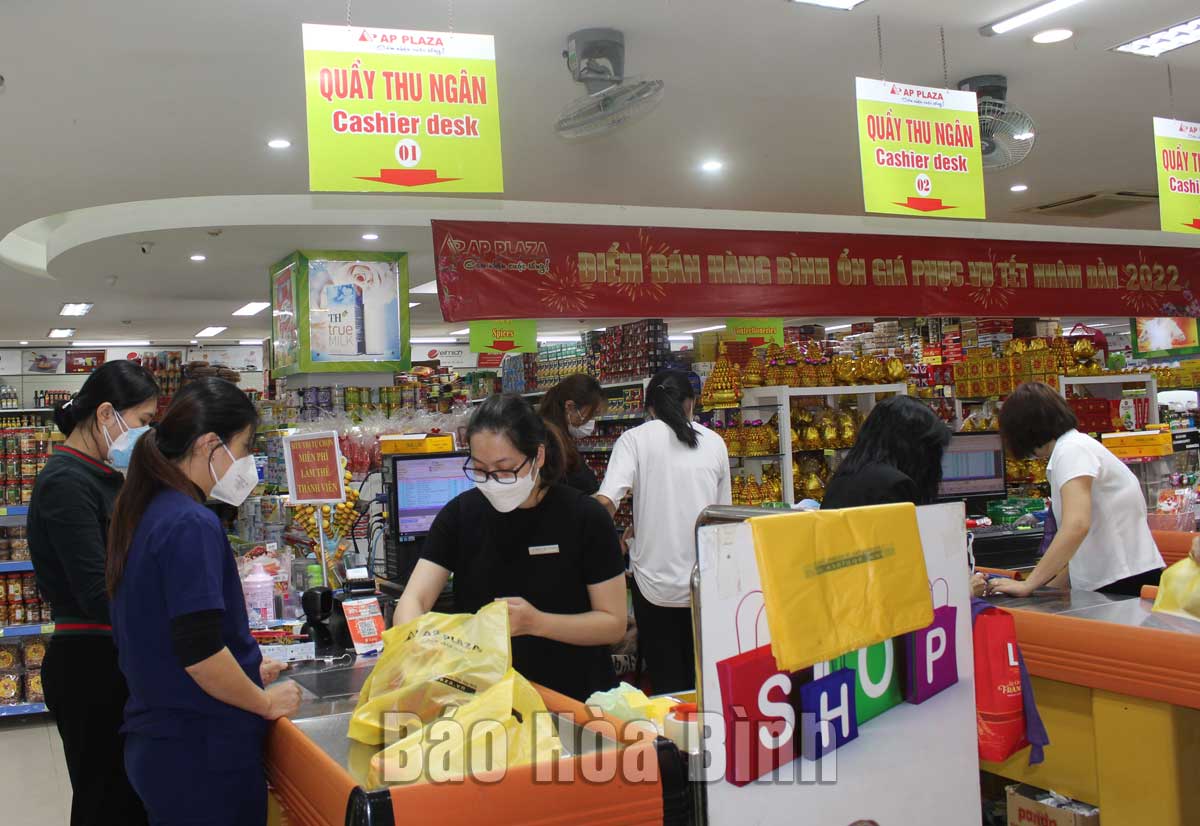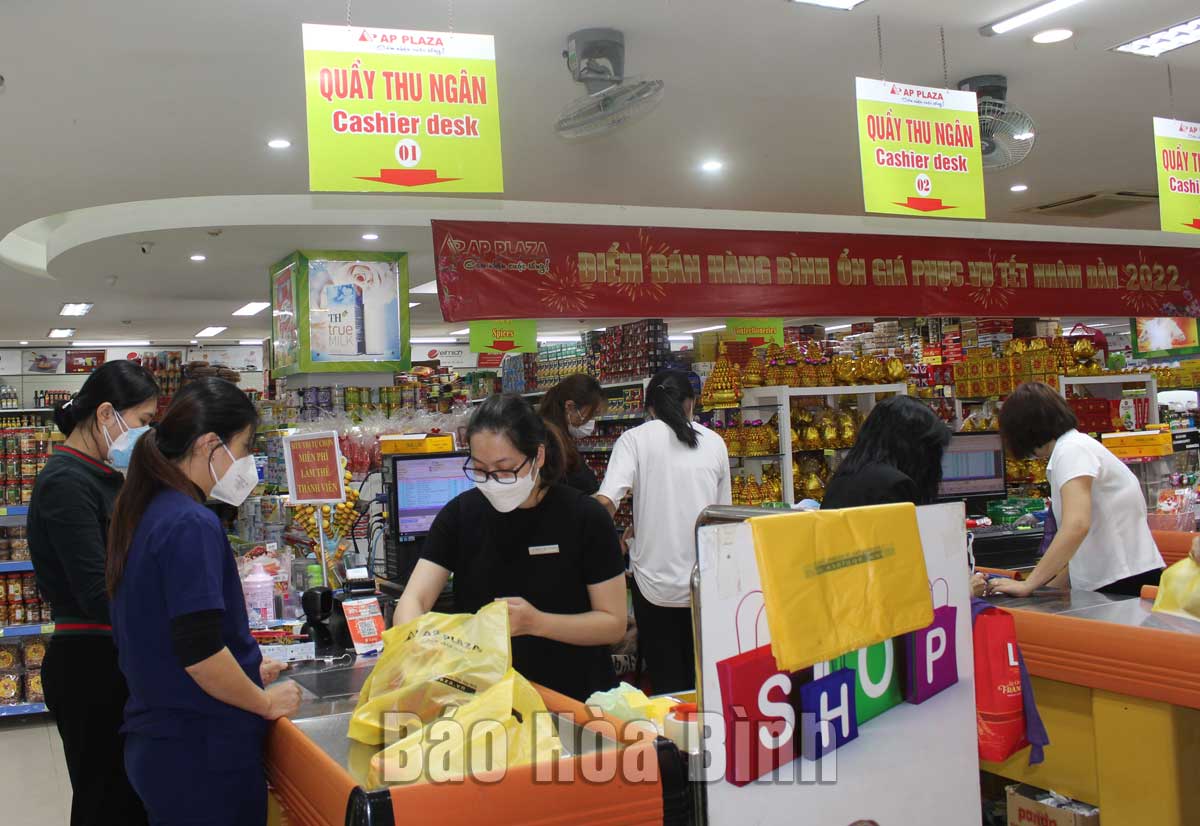
(HBO) - Since the COVID-19 pandemic broke out, consumers have switched to online shopping. To meet the market's demand, Hoa Binh’s facilities and businesses have taken the initiative in putting products for sale on e-commerce marketplaces and websites to stabilise production and ensure workers’ lives.
Most of the
supermarkets and convenience stores accept payments via bank accounts and VNPay
app (Photo taken at AP Plaza in Hoa Binh city).
In 2020, 70 percent of firms in Hoa Binh used email for their activities, more
than 30 percent owned websites; over 30 percent sold their products on
e-commerce sites and over 20 percent used specific software.
The agricultural sector faced various hardships last year
and the provincial Department of Agriculture and Rural Development and relevant
agencies assisted local farmers with selling their products on e-commerce
platforms.
Together with Postmart.vn and Voso.vn, training courses
were held across 10 districts and Hoa Binh city for about 2,900 agricultural
production households and cooperatives. As a result, 443 collectives and
individuals started to sell products on Postmart.vn and 486 at Voso.vn.
Bui Van Mien, director of Son Thuy agricultural service cooperative
in Xuan Thuy commune (Kim Boi district), said e-commerce platforms boosted the
sale of Son Thuy longan last year and helped the cooperative connect with
consumers and save costs.
A large number of supermarkets and convenience stores in
the province now also sell products online.
Deputy Director of AP Plaza Hoang Thi Tuoi said when the province reported
COVID-19 outbreaks, the supermarket launched online shopping and free delivery
services for invoices of at least 150,000 VND (6.6 USD). It also accepted
payments made via VNPay and bank accounts to avoid direct contact.
For the 2021-2025 period, Hoa Binh targets to have 55 percent of its population
purchase products online; 50 percent of supermarkets, shopping malls,
distributors, families and individuals use cashless payment methods; revenues
of business-to-consumer (B2C) e-commerce business models expand 15-20 percent
annually and that of business-to-business (B2B) models account for 10-15
percent of export turnover by 2025.
In addition, about 80 percent of local firms will own websites and all
supermarkets and shopping malls have point of sale (POS) software and 70
percent of utility providers accept cashless payments and issue e-invoice for
consumers./.
According to data from the Hoa Binh Provincial Party Committee, the industrial production index for the first six months of 2025 is estimated to have increased by 20% compared to the same period last year. This marks the highest year-on-year growth rate for this period since 2020.
In the first six months of 2025, Hoa Binh province’s export turnover was estimated at 1.145 billion USD, marking an 18.11% increase compared to the same period in 2024. Import turnover was estimated at $ 804 million, a 17.15% increase, which helped the province maintain a positive trade balance.
The lives of the ethnic minority farmers in Tan Lac district have gradually improved thanks to the new directions in agricultural production. This is a testament to the collective strength fostered through the professional associations and groups implemented by various levels of the district’s Farmers’ Union.
With the motto the "product quality comes first,” after nearly one year of establishment and operation, Muong village’s Clean Food Agricultural and Commercial Cooperative, located in Cau Hamlet, Hung Son Commune (Kim Boi district), has launched reputable, high-quality agricultural products to the market that are well-received by consumers. The products such as Muong village’s pork sausage, salt-cured chicken, and salt-cured pork hocks have gradually carved out a place in the market and they are on the path to obtaining the OCOP certification.
In the past, the phrase "bumper harvest, rock-bottom prices" was a familiar refrain for Vietnamese farmers engaged in fragmented, small-scale agriculture. But today, a new spirit is emerging across rural areas of Hoa Binh province - one of collaboration, organisation, and collective economic models that provide a stable foundation for production.
Maintaining growing area codes and packing facility codes in accordance with regulations is a mandatory requirement for agricultural products to be eligible for export. Recently, the Department of Agriculture and Environment of Hoa Binh province has intensified technical supervision of designated farming areas and packing facilities to safeguard the "green passport" that enables its products to access international markets.



